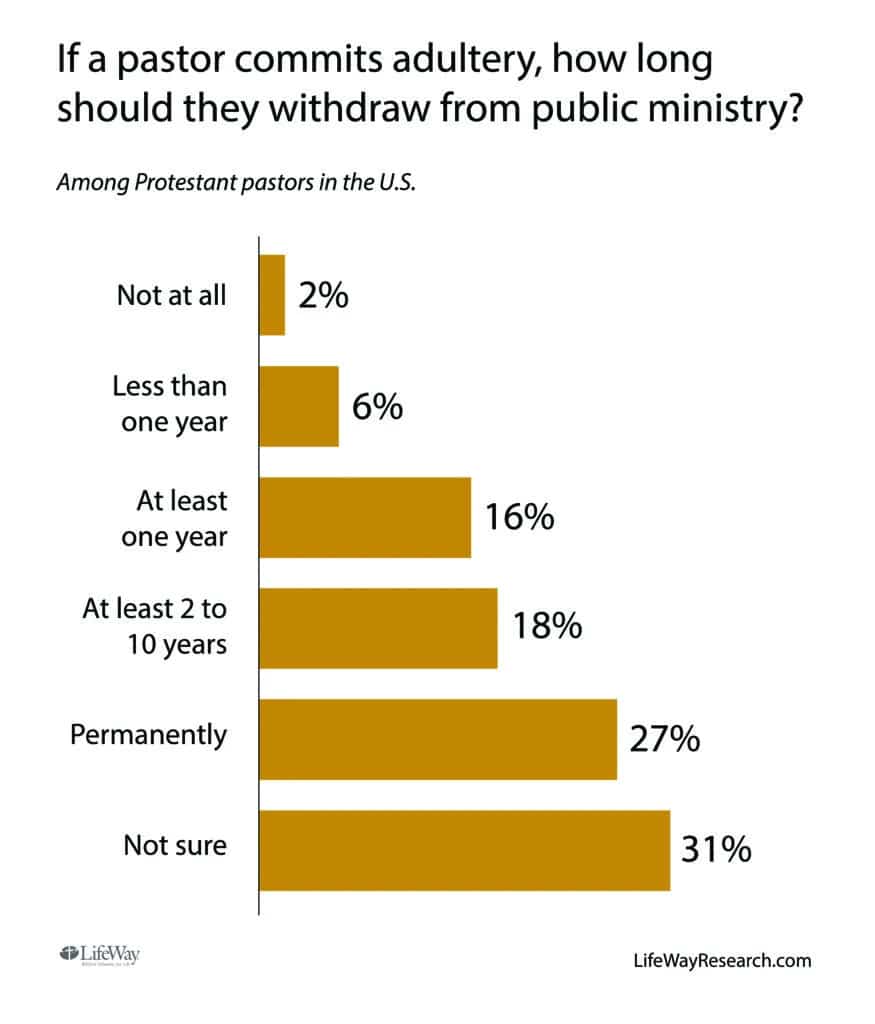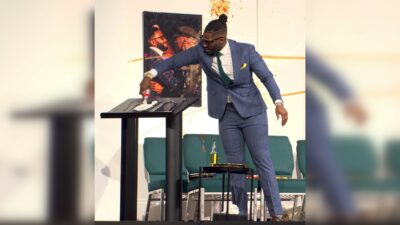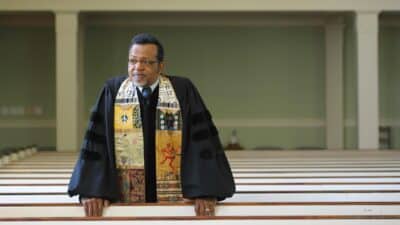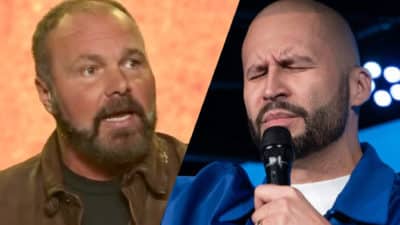On September 27, 2022, Religion & Politics published an essay of mine on why evangelicals love redemption stories. Reflecting on fallen Hillsong NYC pastor Carl Lentz, I escribió:
As for Carl and Laura Lentz, I’m not a betting woman, and I can’t speak to their personal lives or transformation off the screen and the stage. But I’ve seen enough to wager that Carl will announce a return to church ministry within six months, and that he and/or Laura will announce a book detailing their experience within a year.
Then, on March 28, 2023 — six months to the day — Religion News Service reportado that Lentz would be joining the staff of Transformation, a nondenominational megachurch in Tulsa, Oklahoma, led by pastor Michael Todd.
Maybe I need to spend a weekend in Atlantic City.
Gambling jokes aside (I have been to Las Vegas once, with my parents; we spent a lot of time birdwatching in the desert), it brings me no joy to see disgraced pastors return to church ministry, when church ministry was the context that likely spurred their downfall in the first place.
When people of faith raise concerns about disqualified leaders returning to ministry, it can seem mean-spirited or hard of heart. Christians, of all people, are to be gracious and quick to forgive, since we believe God has extended immeasurable grace to us in the person of Christ. Everyone deserves a second chance. No one is the sum of their darkest moments. God is in the business of redeeming lives. And so on.
Your tax-deductible gift helps our journalists report the truth and hold Christian leaders and organizations accountable. Give a gift of $30 or more to The Roys Report this month, and you will receive a copy of “Hurt and Healed by the Church” by Ryan George. To donate, haga clic aquí.
Pero redemption is not the same as restoration to church leadership. Personal transformation is different from public responsibility. And it’s not loving to quickly* bring a fellow Christian back to the spotlight, when it’s the spotlight that quickened their fall from grace in the first place. (*I’ll get to questions of timing shortly.)
Qualifications for Pastors
Lentz is among a crop of deeply V-necked megachurch pastors, virtually hired by Hillsong to be a celebrity pastor to celebrities. He was a big reason Hillsong NYC drew Justin Bieber, Selena Gomez, Chris Pratt, and the Kardashians.

In late 2020, Lentz was fired over “leadership issues and breaches of trust, plus a recent revelation of moral failures,” according to the declaración from Hillsong founding pastor Brian Houston. (QUICK HILLSONG RECAP: Houston himself resigned in 2022 after the church launched an investigation into inappropriate behavior. He is currently awaiting a ruling from an Australia court for fallando en reportar his father’s molestation of a minor to authorities. In addition, last month Hillsong found evidence of lavish spending among former top leaders, such as $150,000 in church funds being used for a retreat in Cancun, $16,000 being used for custom skateboards (???), and $37,000 on flowers. If the Hillsong story sounds messy, it very much is.)
Later, Hillsong leaders said they found evidence that Lentz had had multiple affairs. A former nanny of the Lentzes has accused him of sexual abuse. And, a leaked report on the leadership culture of Hillsong East Coast found evidence of abuse, secrecy, and misconduct.
The day after his firing went public, Lentz escribió,
“When you accept the calling of being a pastor, you must live in such a way that it honors the mandate. That it honors the church, and that it honors God. When that does not happen, a change needs to be made and has been made in this case to ensure that standard is upheld.”
Carl is right. The church is to be set apart; it isn’t just another human institution or, God forbid, another business. It’s called out to be the very people of God to proclaim the Good News to a watching world. As such, its leaders called to be set apart. Paul writes about qualifications for pastoral leaders in 1 Timothy 3. Character traits mentioned there include being above reproach, self-controlled, sensible, able to teach, gentle, not greedy, and having “a good reputation among outsiders” (3:7).
None of us can know whether Lentz resembles Paul’s pastoral qualifications two-plus years after his leaving Hillsong. It’s important to remember that most of us don’t actually saber these platformed leaders. We may get a sense about them, a whole vibe, from afar. But liking someone’s podcast or books or Instagram presence is not the same as personal knowledge of their character and integrity. That takes time — to witness, and to cultivate.
Further, most of us aren’t in a position to prevent fallen pastors from returning to ministry. I have my little Substack where I share my little thoughts, but Michael Todd, the “preacher-influencer” at Transformation, is gonna Michael Todd. One reason I predicted Lentz’s return to church ministry is that these men seem to inevitably find a network of men who can vouch for them, give them another chance, and play a key role in their redemption story.
It’s possible that Lentz has practiced true repentance. We can and should hope for that. In the New Testament, though, to repent means to turn around, to go in a different direction, to amend one’s life. As such, a megachurch is the last place Lentz needs to be — especially if he has spiritual authority over people whom he could hurt. And especially a megachurch led by a spotlight-grabbing pastor in his own right.
‘When can the pastor come back?’
When we talk about celebrity pastor scandals, inevitably the question of timing arises. How long does someone need to be out of public ministry before they can return in a healthy way, that gives them time to address pathologies and sin patterns and wounds, and also to make amends with anyone they have harmed?

I have my own hunches about what’s too fast and what’s appropriate. When people ask this question, I often point to wisdom from Chuck DeGroat, professor of counseling and Christian spirituality at Western Theological Seminary and author of the excellent book Cuando el narcisismo llega a la iglesia. He spoke with me and Roxanne Stone for our special podcast series on celebrity. He has met with hundreds of pastors coming to him because they have had some moral failure and are out of the pastorate, or because the people around them perceive that they are on the brink.
Chuck counsels 10 years. 10 years out of public ministry. 10 years to heal, to rest, to make amends, to repair one’s marriage and family life, to rediscover one’s belovedness apart from the adoration and performative spiritual guru-ism that we like to project upon church leaders. 10 years to lay down the appearance of being uber-spiritual, uber-competent, uber-attractive, the perfect “husband. father. pastor.” (There’s a kind of Christian subculture that’s happy with the performance of godliness among leaders without caring to learn whether that godliness goes very deep.) 10 years to simply be rather than do, to rest in God rather than produce for God.
10 years, I’m sure, would feel like a terribly long time to be out of pastoral ministry. If someone told me I couldn’t write or edit for the next decade, I’d feel that an essential part of my identity and vocation were dying. But this is what God has called me to do! Look at the fruit! Surely God wouldn’t deny me to express my talents (for him of course!)?
But what if dying is the point? What if staying out of the spotlight is supposed to feel like a death of self because it is — because dying to self is part of our deep transformation and, indeed, freedom? What if the cycles of nature that Jesus pointed to in his parables, that are so beautifully on display this time of year, display the deep truth that “unless a seed falls into the ground and dies, it will only be a seed. If it dies, it will give much grain” (John 12:24)? What if new life is always preceded by death?
Whether or not 10 years seems too long to us to ask a fallen pastor to remain out of ministry, perhaps the deeper question is: Why do they want to come back? Isn’t the desire to come back a sign that they are not ready?
Obviously Carl Lentz is responsible for a lot of what went down at Hillsong NYC. But there’s strong evidence that Hillsong leaders also made him a fall guy to distract from deeper cultural and spiritual toxicity throughout the global network. Someone can actively perpetrate harm in a church culture, and also be a victim of it. As such, I hope Transformation Church is actively invested in his and his family’s well-being and holistic flourishing and, crucially, accountability.
I’m not a betting woman, but I’ve seen enough to wager that there’s more going on at Transformation, and that it’s way too soon for Carl’s return.
This article has been republished from The Beaty Beat.
 Katelyn Beaty is author of Celebrities for Jesus: How Personas, Platforms, and Profits Are Hurting the Church (2022) as well as editorial director of Brazos Press. An Ohio native, she lives in Brooklyn, NY. Learn more at KatelynBeaty.com.
Katelyn Beaty is author of Celebrities for Jesus: How Personas, Platforms, and Profits Are Hurting the Church (2022) as well as editorial director of Brazos Press. An Ohio native, she lives in Brooklyn, NY. Learn more at KatelynBeaty.com.
Editor’s note: Click below to hear Katelyn Beaty discuss her book in a recent edition of El Informe Roys pódcast





















15 Respuestas
Very good article Katelyn Beaty! Sadly it does seem to be a carousel: bring shame upon The Faith (Church) leave and within a short time, be given a position in another Church. Its no surprise if (when) they become “repeat offenders”..
Totally agree with Katelyn’s article. I wish the church would be better equipped and prepared to restore fallen leaders. Without holding leaders accountable for their actions and a process for redemption and restitution, we are destined to continue a cycle of abuse from the pulpit.
Really, this such a good subject that books should be written on it. At 72 years old, I have been in ministry for 50 years. In our little town of over 200,000, we must have at least 250 churches. Repeatedly, this has been an issue. My sense is that 10 years is certainly not a bad idea. But let’s look at it by the Biblical perspective. The prodigal son came home with an attitude of “make me a servant”. Not “Put me back on staff”. Jimmy Swaggart was one of my first learning lessons. The Assembly of God took away his license for a year, at which time he announced he would not stand for that and left the Assembly. Where was the prodigal son attitude? Repeatedly, even endlessly, I have seen this arrogant attitude. And of course, humility is often faked. Just not with Jimmy. However, in my city, most pastors want back in the pulpit in about a year. In 50 years of watching and ministry, I have never seen that work. After 10 years of being a faithful Christian, and if they still have a prodigal son attitude, maybe they could become an assistant youth pastor, or a Sunday school teacher, but never the Sr. Pastor again.
Restore to discipleship immediately. To ministry leadership? I have said this a dozen times on this site. They should work and be disciples. No more spotlight.
Thank you Katelyn. Such an articulate and compelling article. Your words and thoughts reflect the majority of us, I suspect. Thank you for giving voice to those of us without a platform but who are trying to make an impact in our every day work and life. Please do not stop doing what you do so incredibly well. We need you and more reporters like you and TRR.
How is it that when certain people get to a point in their ministry to either nothing can bring them down or where their success prevents humility?
Too many tend to look at numbers under their authority as proof of success and it boosts their ego.
One local church where I live in in an investigation of sexual misconduct. Sadly, the pastor committed suicide a few years ago.
It’s like when church attendance gets too big, the pastor thinks passing the buck to other leaders allows him to sneak in the shadows. They leave humiliated rather than be humbled.
The article communicates good thinking on errant pastors in mega-churches. I would agree to the 10 year thought, of being out of ministry. It would of course, apply to any size church.
I would suggest a small point of correction. First I agree, it takes a long period of time to become genuine and to recover from deep moral failure.
But the point of correction is this: repentance in the Koine Greek New Testament, actually means to ‘change your mind’. Ask a Professor from the Seminary mentioned for a short catechism of the Greek word ‘repent’.
And of course, you gave a great presentation. Thank you.
Katelyn offers coherent narrative, it authored from an identifiable point of view. That point of view may differ from the point of view that Evangelical Christianity tends to existentially and experientially involve. Such that it may be wise to explore differences in what “leadership” is in two broad genres of Christianity: the one perhaps more grounded in theology and celebreality, it having a long historical history of gestation and development, and it thereby having greater proximity to established society and culture; the other more grounded in personal experience and feeling; it arising out of the present and its circumstance; it perhaps tending to distinguish itself from established society and culture, by way of pointing to a future that arises out of experienced revelation in the present. The crucial point being that we here perhaps have two distinct modalities of leadership: the one having to be consistent with all that a historical and theological origin demands, so leadership as per Paul; the other being more an energiser that has to come about in the present, that works for its adherents across something like a magnetic flux,
My sense then is, that Evangelical Christian leaders will tend to burn out, fail, crash and burn. Can they then be recycled for another tour of duty. On recycled duty, can they convey anything to Evangelical Christians about the dynamics and exigencies of evangelical being; can they continue to usefully evangelically energise.
Being a pastor is a high calling and it calls for the highest of character. In my humble opinion, I believe the covenant of marriage is the most sacred of all. If you break that vow, you are permanently disqualified to ever be a pastor again. You can be forgiven and fully healed, but you have lost the ability to ever have that high calling again. You made a choice to break it.
When you commit a felony, you pay your time but there are certain consequences that will follow you for life. You can not carry a weapon and you cannot vote. Those are consequences of your bad choices.
How do you define breaking your marriage vows? There are many people who have been punished or mistreated by churches because they sought a divorce due to their spouse breaking the marriage vows. Are you saying that a divorced individual would be permanently disqualified to be a pastor, even if it was the other person that broke the vows or would a divorced person need to prove to the church that they kept the vows?
For that matter, is prior commission of a felony disqualifying for being a pastor? I know two gentlemen who have prior felony convictions, including prison time, who pastor a church. They have put in considerable time and effort to show that they have repented for their past choices. The mission of the church they pastor is to reach people like them – people who have things in their past that make it difficult for them to attend other churches in the community. These guys have a tremendous ministry and can empathize with their congregants in ways that others can’t due to their own past experience.
I define breaking wedding vows as cheating on your spouse.
The reference to a felony was an example of permanent consequences of making a bad choice.
So, simply said, if you choose to cheat on your spouse, you have lost the privilege of having the honor of being a pastor.
We must always exhibit grace, but not cheap grace. We must always forgive, but not enable.
When a pastor embraces a celebrity lifestyle, seeking things of the world, and shows that the gifts of the HOLY SPIRIT (Galations 5:22-23) are not present, then that individual should never assume a leadership position in the church.
The Old Testament, teaches that a false priest would be put to death. Thanks to our loving and gracious GOD, we now have a different dispensation.
However, if that individual was truly saved, their heart would be rendered. The Holy Spirit would compel that individual to humble service, not celebrity.
LORD JESUS was very clear in HIS teaching that false priests would abound. Restore a disgraced priest to the pulpet? Why do we not listen to LORD JESUS?
The disgraced can be restored to fellowship, if the fruits of the HOLY SPIRIT are proven (Ezekiel 36:26-27), but never to a place of leadership.
I wonder if someday we will look back and recognize the error of calling these institutions “churches” and their CEO celebrities “pastors.” I have decided that it is not healthy for me to be in these cultures that devolve into celebrity worship, manipulation of followers, abuse of finances, not to mention the need for leaders and followers to live with shame and secrets for being a part of a system that puts on a show of particular beliefs. Why do we keep defending and chasing the next narcissistic egomaniac who says all of the things that tickles our ears? This pastor’s indiscretions were brought to light, while most never get uncovered, and yet we want to believe the best in these institutions. Power, celebrity, money, and sex are the driving forces for these men. And all they have to do is sprinkle words like “Jesus loves you” “Amazing Grace” and clever words to keep everyone at arm’s length as they continue to abuse and traumatize their followers. Sometimes condemned buildings need to be brought down. And something new and beautiful can replace the old. That is my hope for humanity. But these guys are far from the hope. Recycling abusers is not a means of grace as more abuse is likely.
perhaps before a pastor is accepted in that position they should be examined by a professional for narcicist tendencies–they seem to have the attitude they can do anything and everyone is below them and there to serve their selfish ends.
I’m sure there have been pastors who have been booted out of their congregations after some unacceptable, or even felonious behavior and go on to make an honest living in some secular field. Tent-making, maybe. I’ve never heard of it, but I’m sure it happens.
Maybe we shouldn’t ignore the possibility that the fallen pastors who return to the ministry do so because they’re unemployable in any honest line of work. See, Jeremiah 13:23. We don’t license preachers in this country, so there’s really no way to keep them out of the pulpit. On the other hand, There was a noted television preacher, now deceased, who used to say, “God ain’t runnin’ short.” We can expect that newer voices, ideally more suited to the pastoral life, will be raised up to take the places of the bad actors once they’re gone. We can say how awful it is for them to be adopting the Roman practice of moving from one church to the next, and it is certainly not good, but if they can draw a crowd, that’s ultimately on the people who want to buy their books and hear their sermons.
But what I’m wondering is: If the question is, “If a pastor commits adultery, how long should they withdraw from public ministry?” how is it that 2% of the respondents said, “Not at all” while 27% said, “Permanently”. How does that work?